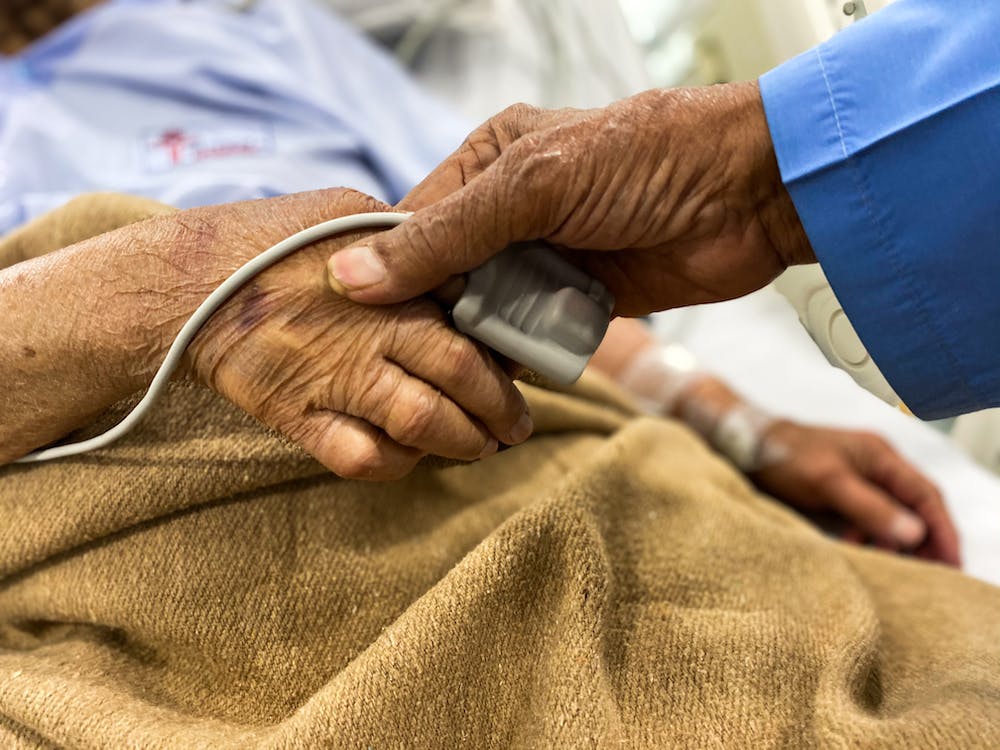12 Common Signs Death is Approaching
When someone we love is nearing the end of life, the experience can feel overwhelming, confusing, and painfully uncertain. As a long-time geriatric care manager, I’ve walked alongside countless families during these tender final moments—and I know how important it is to understand what’s happening.
Recognizing the common signs death is approaching won’t make the journey any easier, but it does help families prepare emotionally, make informed decisions, and provide comfort with confidence and love. This guide isn’t just about what to expect physically—it’s about holding space, honoring dignity, and walking hand-in-hand through one of life’s most sacred transitions.
Let’s walk through the 12 most common signs together, one step at a time.
1. Increased Sleep and Unresponsiveness
One of the earliest and most noticeable signs that death may be approaching is a significant increase in sleep. Your loved one might begin sleeping for most of the day and become harder to wake. When they are awake, they may seem groggy, confused, or disconnected from what’s happening around them.
This happens because the body is naturally conserving energy as it slowly shuts down. Think of it as nature’s gentle way of easing someone out of the physical world. It doesn’t mean they’re giving up—it simply means their body is doing what it needs to do.
You may notice that while your loved one doesn’t respond with words or eye contact, they can still hear you. In fact, hearing is often one of the last senses to go. So keep talking. Tell them you love them. Remind them of beautiful memories. Your voice can be a tremendous comfort, even in silence.
2. Decreased Appetite and Thirst
This is the one that catches families off guard the most.
I can’t tell you how many times I’ve had heartbroken sons and daughters say, “But Mom hasn’t eaten in days—she’s wasting away!” And I get it. Feeding someone has always been one of the purest ways we show love. It’s what we do when someone’s sick, sad, or celebrating. So when they stop eating or drinking, it can feel like we’re failing them.
But here’s the truth: the body knows exactly what it’s doing.
At the end of life, eating and drinking often stop because the digestive system is slowing down. The body is shifting all its energy toward comfort and shutting down gently—not toward breaking down dinner. Trying to force food or fluids can cause nausea, discomfort, or even aspiration.
So what can you do? Be present. Keep their lips moist with a damp sponge or soft cloth. Offer ice chips or a drop of water if they’re awake and want it. Use lip balm to prevent cracking. These tiny acts of care are far more meaningful than any meal.
And remember: they’re not hungry. They’re not thirsty. They’re just moving on from needing those things.
3. Changes in Breathing Patterns
This part can be unsettling if you’ve never witnessed it before. Breathing changes are one of the clearest signs that the body is winding down—but they’re also one of the most misunderstood.
You might notice long pauses between breaths, shallow breathing, or something called Cheyne-Stokes respiration—a rhythmic pattern where breathing becomes faster, then slower, then stops briefly before starting again. It can sound strange, even alarming, but it’s not painful. In fact, your loved one likely isn’t aware of it at all.
In the final days or hours, breathing may become noisy or gurgly too. That’s from saliva and secretions collecting in the throat because the swallow reflex isn’t working like it used to. Some folks call this the “death rattle.” Sounds frightening, doesn’t it? But rest assured—it bothers families far more than it bothers the person dying.
If this happens, repositioning your loved one on their side or slightly elevating their head can help. Hospice nurses may also recommend medications to reduce secretions if needed.
This stage is where it’s most important to stay calm. Hold their hand. Speak softly. You’re helping them feel safe while nature takes the lead.
4. Mottled Skin and Cool Extremities

If you notice your loved one’s hands or feet turning cool, bluish, or blotchy with a purplish pattern—don’t panic. This is something called mottling, and it’s a normal, expected sign that circulation is slowing down. The body is directing blood flow toward the core to keep the vital organs going just a little longer.
It can be jarring to see, especially if the person was warm and pink just days earlier. But mottling doesn’t mean they’re in pain or that something’s wrong—it means the body is gracefully preparing for its final rest.
Fingers and toes may feel icy. The knees, elbows, and lips may look dusky or pale. But none of this is cause for medical alarm.
What helps in this moment isn’t fixing, but comforting. You can gently place warm blankets on their legs or feet if you’d like, but avoid electric heating pads or hot water bottles—they can be too harsh on sensitive skin.
What matters most is your presence. A warm touch. A soothing voice. Let them know they’re not alone in this part of the journey.
5. Decreased Urine Output and Incontinence
Here’s another one that can make families feel helpless—but it’s completely natural.
As the body slows down, the kidneys begin to shut down too. That means less urine, darker in color, sometimes with long gaps between bathroom trips—or none at all. For someone who’s barely eating or drinking, this is to be expected. The body simply doesn’t have much left to process.
Incontinence may also occur, especially if your loved one is no longer able to get up or signal when they need help. This doesn’t mean they’re “losing dignity”—it means the body is doing what it must. And our job? To protect that dignity through gentle, respectful care.
Use soft, absorbent pads or adult briefs. Keep the skin clean and dry with warm water and mild soap. A bit of barrier cream can go a long way in preventing irritation. And above all, keep the tone warm and calm. No one wants to feel like a burden.
You’re not just managing physical needs—you’re offering love in one of its most sacred forms: quiet, humble service.
6. Restlessness and Agitation
This is one of the more emotionally difficult signs to witness, especially if your loved one has always been calm or peaceful.
Restlessness can show up in many ways—tugging at sheets, pulling at clothes, trying to get out of bed, or repeating movements over and over. Sometimes they might mumble or say stuff that don’t quite make sense. You might even notice sudden outbursts or a sense of panic in their eyes.
Let me be clear: this isn’t them. This is the brain, under stress, reacting to chemical and physical changes as the body prepares to shut down. It doesn’t mean they’re suffering emotionally, and it certainly doesn’t mean they’re trying to upset you.
Often, it helps just to sit with them. Speak softly. Place your hand gently in theirs. Play calming music or softly hum a familiar tune. These are moments where your presence does more than any medication could.
That said, if the agitation feels severe or persistent, don’t hesitate to reach out to your hospice or palliative care team. There are gentle medications and strategies that can help ease the transition.
This is not a sign that things are going wrong—it’s a sign that things are moving forward.
7. Hallucinations and Vision-like Experiences
This is where things can feel almost mystical.
Many people nearing the end of life begin to see or speak to people who aren’t physically present—often deceased loved ones, pets, or even spiritual figures. They may reach out to someone unseen, smile mid-sentence, or carry on conversations that, to us, make no logical sense.
But to them? It’s as real as anything else.
I’ve had families tell me their mother spoke to her own mother for hours before passing. Or that their father suddenly looked up, smiled, and whispered, “There you are.” These experiences are common, comforting, and—believe it or not—normal.
Don’t correct them. Don’t dismiss it as confusion or delusion. Just be present. Nod. Smile. Listen. These visions are often part of a peaceful transition, like a gentle hand reaching out to help them cross.
It’s okay to be moved by it. I still get goosebumps when I recall some of the things I’ve seen and heard over the years. In these moments, we’re reminded: this process is bigger than all of us.
8. Withdrawal and Decreased Social Interaction
This is the moment that breaks a lot of hearts.
You walk into the room, and the person you love—who used to light up when you entered—barely opens their eyes. They don’t respond. They don’t ask how you are. Maybe they even turn their head away. And it stings.
But I want you to know something with all my heart: this is not personal. This is not a sign of sadness or anger or giving up. It’s the body, the mind, and the spirit starting to let go of the outside world so they can focus on the journey ahead.
I often compare it to a plane slowly descending—you don’t chat much on the way down. You’re buckled in. You’re quiet. You’re preparing to land.
So don’t try to pull them back into conversations. Don’t force smiles or energy. Instead, meet them where they are. Sit with them. Play soft music. Rub lotion on their hands. Speak softly, or just be still.
And know this: even when they seem far away, they can feel your love.
Sometimes, the most powerful thing you can say is nothing at all.
9. Surge of Energy
This one catches people off guard—because just when everyone is bracing for the end, something surprising happens: your loved one seems to perk up.
They might wake up, smile, ask for their favorite meal, or hold a conversation with more clarity than they’ve had in days. It can feel like a miracle. You’ll see tears of joy, hope swell in the room, and maybe even someone whisper, “Maybe they’re getting better…”
But here’s the honest truth, spoken with love: this is usually what we call a rally, and it’s part of the final stage of life.
It can last a few minutes, a few hours, or—rarely—a day or two. No one knows exactly why it happens, but I like to think of it as the spirit giving one last gift: a moment to say goodbye with presence, laughter, or even one final “I love you.”
If this happens, don’t waste time questioning it. Embrace it. Laugh with them. Hold their face in your hands. Let them eat the ice cream. Tell them everything you’ve been meaning to say.
Because this moment is sacred. And fleeting.
10. Changes in Vital Signs
As the body nears its final moments, you’ll start to see clear physical signs that things are slowing down for good this time. These changes might look clinical, but I want you to understand them in plain, human terms.
You may notice their blood pressure dropping, their pulse becoming irregular or faint, or their body temperature going up and down, often making them feel clammy or cool to the touch. Their breathing might change again, too—becoming more shallow, with longer pauses between breaths.
To you, it may seem like the body is confused. But what’s really happening is that it’s doing exactly what it’s meant to: shutting down, bit by bit, with remarkable precision.
Now, you don’t need to monitor these signs like a nurse at a station. You’re not tracking a chart—you’re witnessing a passage. These changes aren’t emergencies. They don’t call for panic. They call for tenderness.
This is the moment to dim the lights. Lower your voice. Put on that special song. Let the atmosphere be peaceful and still. You are ushering someone through their final threshold—and that is an act of extraordinary love.
11. Loss of Consciousness
At some point—usually in the final hours or day—your loved one will slip into a deep sleep and not wake up again.
They may still stir slightly or move a hand. Their chest will continue to rise and fall. But they won’t respond to voices, touch, or sound the way they used to. To the outside world, it looks like they’re just resting.
And in a way… they are.
This stage is where the spirit starts to pull back almost completely. The body is still here, but the person—the essence of who they are—is already halfway out the door. It’s natural. It’s not painful. It’s not frightening for them.
For you, though, it can be heartbreaking. You may wonder if they can hear you, if they know you’re there. Let me be very clear: they can.
Hearing is often the last sense to go. So speak from the heart. Say the things that matter. Tell them it’s okay to go if they’re ready. That you’ll be alright. That they are loved beyond measure.
You are not talking to a shell—you are whispering love into a soul that is still listening.
12. Irregular or Noisy Breathing (Death Rattle)
This is the one sound families never forget—and often the one that worries them the most.
It’s called the death rattle, and it happens when your loved one can no longer swallow or clear secretions from their throat. You’ll hear a wet, gurgling, rattling noise with each breath. It can sound distressing—like they’re choking or struggling—but please, listen carefully: they are not in pain.
They are not gasping. They are not aware of the sound the way you are. This is purely mechanical—air passing over pooled saliva and fluid in the throat. It’s more difficult for you to hear than it is for them to feel.
If you want to ease the sound, gently turn their head to the side or elevate the upper body with pillows. Your hospice team may offer medication to dry up the secretions if needed, but often, nature just needs to run its course.
This stage usually means death is very near—hours, sometimes minutes away. So let the room be filled with peace. Hold their hand. Breathe with them. Speak softly, or just sit in sacred silence.
This is the final chapter. And you’re doing beautifully.
Conclusion
If you’ve made it this far—reading through the signs death is approaching, nodding through your tears, holding your breath at parts—please let me say something from one caregiver’s heart to another:
You are not alone.
Watching someone you love die is one of the hardest things any of us will ever do. But it can also be one of the most meaningful. When we understand what’s happening, we can stop fighting the process and start honoring it. We can trade fear for presence. Panic for peace.
Every sigh, every whisper, every quiet moment at the bedside is a thread in the tapestry of your love. And when the final breath comes, it is not the end of the relationship—it is the beginning of remembrance.
So take a deep breath. Give yourself grace. You’re doing sacred work.
Share This Article:






